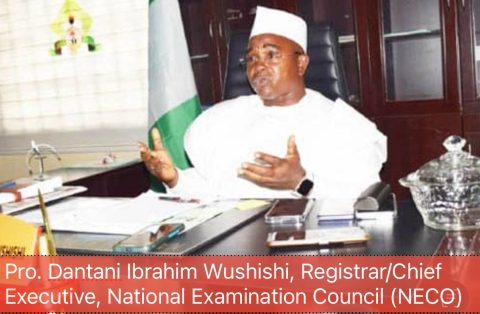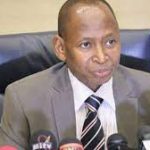We Will Henceforth Take Appropriate Legal Action Against Exam Malpractices –NECO Boss
Exclusive Reports, Exclusive/Investigative Stories, Featured, Interview, Latest Headlines, News Across Nigeria, Personality Profile Monday, November 25th, 2024
In this interview with the Registrar and Chief Executive of National Examination Council (NECO) Prof. Ibrahim Dantani Wushishi, he talks about the ills of the examination malpractices, CBT as well as his vision to put NECO as the best and credible assessment organisation in the country.
Excerpts:
Q: One compelling reason for the establishment of NECO was to relieve WAEC of the heavy load arising from an increased population of students, but the success recorded by NECO, particularly in the last three years, has earned it more responsibilities. NECO now conducts National Common Entrance Examination (NCEE), Basic Education Certificate Examination (BECE), in addition to the Senior Secondary Certificate Examination (SSCE). How are you coping with this incredible feat?
A: It has not been an easy one. When I came in, the condition which we met at NECO at that time was a little bit stable. Because before then, there has been a series of crises to the extent that there was a presidential committee set up by the then minister of education to investigate the causes. As a result of the committee’s recommendation, some people were dismissed from the council, some had their appointment terminated and some were sanctioned. It was at this moment that I took over after the death of the then substantive Chief Executive, Professor Obioma.
So, this was the situation that I met the council. And being the biggest national examination body in the country that conducts conventional examinations, we are saddled with the responsibility of conducting examinations for candidates that are graduating from primary school to secondary school; for those that are interested in getting admission into the Unity colleges. And also the basic education certificate examination for those that are graduating from the junior secondary school, class three to the senior secondary school, both in public and private schools. Then, the big examination which is the SSCE, the senior school certificate examination, which we call an internal because it is school based. It is our largest examination. We also conduct the same SSCE at a smaller scale for those that could not meet all the requirements for admission into tertiary institutions.
To have first hand information, when I took over, I visited offices across the nation to find out the situation of things as far as the work environment was concerned. We observed a lot of infrastructures deficit. Basic items like chairs and tables were inadequate. No power generators in the offices, no photocopiers. So many things were lacking at that time. We also had logistics problems and because we conduct large scale examinations, we require huge logistics. And when I took over, I missed the examination in 2021. We had very few vehicles that would serve the council, grossly inadequate. We had to borrow vehicles from JAMB, borrowed from INEC. We also borrowed from small examination bodies like NAPTIP. I saw clearly the need for us to reposition the council in such a way that staff would find it very convenient to work in order to be able to deliver effectively and efficiently on our mandate.
So it was on this basis that we started repositioning the council by making provisions for some of these work infrastructures. We are conscious of the need to make it easy for staff to work and also in terms of staff welfare. So, we had to also improve staff welfare, even though our concept of making provisions in the workplace to make it conducive is also part of welfare of staff. The staff need a conducive working environment, and by the time you do that the staff will be motivated.
And how do we reward those that are hardworking? How do we reward even a staff that had to serve the council and the staff is exiting after serving in the country for 35 years. So, we needed to motivate staff by making sure we made such provisions.
Q: You inherited a work environment at NECO that was clearly unhealthy. How did you manage to turn the situation around?
A: Before we came in, there was a proposal for welfare. The document was not approved. When I came. I made sure that we dot all the I’s for that document to be approved. I Implemented it. And you know, where there is fairness, people would appreciate and be ready to work and you see tremendous progress in that line. Before we came in, there was no work ethics so to say. Public Service regulations, the condition of service was not adequately put to use in terms of allocating responsibilities to staff. There were a lot of misgivings, staff members were polarized along political, religious, ethnic lines. This had to do with the inadequacies in allocating responsibilities to staff. So, there was nepotism and favouritism playing out clearly. And a lot of people were not happy with the situation. A lot of members of staff became victims of such, and they do not find it easy. So, when we came, we felt it was not supposed to be so. We then looked at the situation and said, what do we do? The first thing we did was to introduce the software that will enable a seamless working operation, one that does not allow lobbying under any guise.
Q: How did you handle the problems arising from conduct of exams?
A: We introduce e-supervision software where selection of supervisors is done digitally. So, if you are interested, you go to state offices. They give you code. You go back, log in and input all your data. The nomination will be done online. We also equally introduce a software that assists the examiners in facilitating the collation of the result. Because there are some institutions or some states who register late and there are some components of data that are supposed to be in the candidate data that might be absent. That software will make it easy for you to locate that same candidate’s result, input the missing data and process the results. We also purchase E-greenery that will give them easy access to current knowledge materials in their own discipline to be able to develop items for examinations. We made provision for internet in the council, the ICT department and the NECO demonstration secondary schools. Our staff fond it easy to assess the E-greenery data. We create an E-library where we domicile the E-greenery database. So, these are some of the things we were able to do.
Q: Your recent election into the Executive Council of the Association for Educational Assessment of Africa. What is in it for Nigeria?
A: It is an organization of assessment bodies in Africa. Every country that has an assessment body is supposed to be part of that professional association. It is an avenue where experts in the assessment industry gather to share ideas and experiences from individual countries to another in order to improve the assessment systems of member countries.
Q: Is it like a peer review body?
A: Exactly, like a peer review kind of… And we also have professional developers or assessment technologists that are also parts of the association. Whenever we have conferences, you have these manufacturers of assessment technologies coming to display their devices and software that has to do with assessment. It has a system of recruiting executive members for the body and this is done originally. We have West African representatives, we have South Africa representatives, we have East African representatives, like that. So, members from each region will gather to nominate and elect representatives of their own region. That was what happened in South Africa that got me into the Executive Council of AEAA.
Q: In the recently concluded 2024 SSCE examinations, there were about 40 schools across 17 states, where your eagle-eyed officials were able to detect some malfeasance and then you promised to take action. How far have you gone on that sir?
A: We have a process of dealing with examination malpractices. As far as NECO is concerned, we have zero tolerance for examination malpractices. We have therefore put measures in place to check examination malpractices. It occurs at different stages, i.e, before, during and after examinations. And since there are different types of examination malpractices. We have a list of them. So we tighten the nuts. We keep our eyes on how to identify these different types of malpractices before, during and after the examination. Even after the actual examinations, we do detect malpractices during the marking of scripts. In the department of quality assurance, we have a division that is handling examination malpractices. The division is in charge of collating Information given to invigilators and monitors of examinations in the field to detect malpractices. After collecting all these reports, they have a committee that sits to look at the different reports and analyse it. They are the ones responsible for determining the level of malpractice in each of the examinations. And to curb malpractices, we physically involve uniform personnel to man certain areas during examinations. We also employ the services of plain clothes security agents that are deployed in all our centers across the nation when examinations are going on, so apart from the fact that we have our internal examination monitors that will go round. We also have invigilators that are also conducting the examinations at the centers. They have forms that they fill whenever there are situations or somebody is caught cheating. We have also processes of sanctioning erring schools. Just like you said, 40 schools across 17 states. We gave them the benefit of fair hearing. We invited them to our headquarters here. We showed them evidence of malpractices that had to do with their schools, practical evidence. So, they defended themselves. The way it is done is, if you have a defence, give us your defence but if you don’t have a convincing defence then be sure we are going to apply appropriate sanction. The issue is, because we have not been exploring the law, (Examination Malpractices Offences) Act No. 30. We felt it is high time we start taking appropriate legal actions where we really have to prosecute those that we caught with the issue of examination malpractices.
We have, Examination Malpractices Intelligence Committee. They monitor the internet to identify phishing sites that engage in racketeering of examination questions.We have been able to tackle that head long, so we are not sleeping. Right now, we are not having such challenges as far as the current situations are concerned. But then, this is not peculiar to Nigeria. The problem of phishing site is a global phenomenon as far as examination malpractices are concerned. We went to an international conference, I think it was in Jamaica, somebody from Indonesia, after presenting a paper on examination malpractices, I walked up to him and asked how do you tackle this? How do we get you to collaborate with us to educate us on how to tackle examination malpractices? It’s a global phenomenon. And these are the avenues where we meet stakeholders from other countries and share ideas.
At the home level. We organize sensitization programmes for the citizens. We have what we call ‘School Challenge’ which is a Radio programme being handled by FM 105.5, FM, Bida here and Radio Nigeria F.M Station. We sponsor that to sensitize students on the ills of examination malpractices. In 2022, we organized a seminar in conjunction with the National Assembly. We organized seminars on examination malpractices in Lagos, Abuja and South-South, specifically in Akwa Ibom state. We are making a serious effort to sensitize the populace on the ills of exam malpractices. Also during examinations, we sponsor jingles on Televisions and Radios highlighting the ills of examination malpractices across the nation.
Q: What are the challenges confronting NECO?
A: We have several challenges confronting NECO. We have deficits in office accommodation across the states. We are not drawing appropriation for capital projects. As far as the council is concerned, for close to 20 years, we have not been doing this. But we are making efforts and our efforts have started yielding fruit. We are currently building 10 offices across 10 states, three funded from our IGR, seven from the effort we made to draw from the national appropriation in 2023. So we are making an effort to see that at least we close this deficit gap. Provision of offices is a challenge to NECO because 75% of our offices are rented apartments. We pay rent, so you can see the huge amount of money the Council has to spend on payment of rent. And sometimes, we also enter into the problem of litigation. Some of the landlords take the Council to court as a result of one minor thing or the other. We also have to spend money going to court to defend the Council. This for us is a big problem we have to resolve one and for all.
We also have challenges in the area of logistics, even though we have been able to buy more than 75 brand new Hilux vehicles for staff and also for other logistics run during the examination. This added to our fleet. When we had the opportunity to do that we did not waste it, we bought these brand-new vehicles. Now, our logistic problems are reducing. But it is still a challenge we need to surmount. Government is not giving us money or how do I put it? We do not receive overhead to run the Council. We are partially funded. We generate our money and they take 80% and they leave 20% for us to run the Council. So you find out that the issue of availability of funds is very critical to our operation. It constitutes one of the biggest challenges. Some journalists have been threatening. They said that we have not paid our examiners three months after the examination and one month after we release the results. Of course, it is because we are financially constrained. It is not that we have not been paying. We have been paying. The entire payment for examiners cut across 24 banks where we have to make the payment. About 72,000 of them. Yes, 72,000 examiners and out of this, we have paid more than 40,000 examiners where we are paying bank to bank. And as a result of money constraints, we have to wait to have some payment from states that have taken loans from us to conduct the examination. After conducting the examination, they pay for the students they have subscribed for. We have to follow up on them for them to make payments. We cannot make payment when the money is outside. We have to follow up to get the money and we make payment before they start complaining and writing on it. As of November, we had paid 21 banks before 8th of November, (2024) when they started complaining, we had paid 21 banks out of 24, only three banks remained, And today, Monday ( 11th November), we paid the 22nd banks and we have only two banks left and people are complaining that we are exhibiting negligence attitude towards paying remuneration. We do not blame them. They have the right. You know, we appreciate their input. As far as the ad-hoc responsibility we gave them is concerned, they did their work and they are expecting that after the work we give them their money. We have not been owing because since I came in, we have not delayed any payment. We are always mindful of this once we have such money, not even our staff, people we engage their services on ad-hoc basis to assist us on this job. It is in our collective interest not just in the interest of the council alone. It is not out of negligence that we have not been able to pay it. It was because we have monies held there in the states that have not been paid and we are assuring them before the end of the week, we know we are going to clear everything by the grace of God, so they should also be patient. (Note that all payments were completed on Wednesday 13th as promised by the Registrar.)
Q: When will NECO embrace computer-based tests?
A: As soon as possible, when the situation is ripe for it. We do not want to jump into the fog of conducting CBT tests or examinations. No! We have to ensure that once we go into it, we are fully prepared as a professional assessment body that wherever and whenever we conduct examinations, the results would be valid, reliable and authentic. It will be respected and acceptable by the consumers of the results, because certainly people have to consume it, or institutions have to consume it. We do not want to give results that the consumers would be apprehensive about consuming the result. So we are taking our time planning to ensure that at least once we make every provision necessary for the take-off, the public will see us conducting CBT and the results would be full-proof. It will be very credible. All stakeholders will come and see how we are conducting it. We are hoping that once we start conducting CBT, it will be hitch-free.
Q: What is your vision for NECO Sir?
A: My vision for NECO is articulated and encapsulated in a document we called Three-years Strategic Development Plan. We have introduced a three year strategic development plan for NECO for the first time. Our vision, our mission and specific activities that will make us achieve that is enunciated in that document. The issue of CBT, the issue of artificial intelligence, are all part of the components of that strategic plan. We have to move in the direction the storm is moving in the globe, so that we are not left behind. We are making sure that we do that. Right now, we have a proposal between NECO and the Enugu State Government. They want NECO to conduct the basic examination using CBT, and we have given them a two year grace period for accreditation. At the end of the two years’ grace, we will go to Enugu State to assess their facilities and their state of readiness for CBT examination to be conducted by NECO. That will be a litmus test for the conduct of NECO CBT. We can do that using the national common entrance, because all the examinations of the national common entrance and the national gifted examinations are conducted on the basis of multiple choice. So it is easy that we conduct that and we have our results easily transmitted and processed within a very short period. But there are a lot of challenges that will come with it. The provision of infrastructure, which has to do with provision of computer centres that are well-equipped with computers. So also is the security of the centres. We also require CCTV logistics at the centres CCTV logistics. There is a huge infrastructure input at every CBT center. And what we need to do to achieve that is finance. Without it, we will not be able to do it or purchase and manage the centers. There are some centers across the world, there are some institutions that are professionals in providing the backbone needed for CBT. We will look at those ones that are very credible to see how we could be able to do that. To conduct a CBT, for example, for our major examination to continue to record an increase in the number of candidates from 1.1million now to 1.3 million candidates. You imagine in 76 subjects that we conduct examinations at that level, 76 subjects and close to 200 different papers across the 76 subjects. You imagine each of these subjects also has multiple choice options for an examination. So if you take three subjects, for example, English, Maths, Civic Education, if you register let’s say 1.3 million candidates, this 1.3 million candidates will sit for multiple choice. So you find that only on three subjects, you will conduct examinations for close to 4 million candidates. CBT for 4 million candidates. So it is not going to be an easy task to provide infrastructure. We do not have to just jump into the fog of conducting CBT. We have to be seriously prepared to deliver effectively and efficiently on such commitment. We do not want to have a situation where we start conducting examinations and candidates will go to the center and we say no, go back and come tomorrow because the servers or the computers are giving us problems after keeping them for hours at the center and at the end of the day they could not even write the examination. The morale of the candidates would be dampened. We don’t want to get ourselves into such a situation.
Q: There was this controversy about the age bracket, 18 years for students to go into higher institutions. What’s your take on this?
A: Well, I think now it is a thing of the past because the minister said he has abolished it. But for me as an educator, I sat with the former minister in the National Assembly when we were invited. The minister also invited us to those events. The members were contesting it. Well, you do a simple calculation, 6-3-3-4, six years of primary. And if you go by the national policy on education, six years of primary, three in junior secondary, three in senior secondary. There is one year of nursery school for public school, one year nursery and six-year primary that is seven. That is 17years. You are expected to start nursery one at a level that you can identify symbols. If you go by some learning theories, the learning theory on behavioral development, you will find out that you can not do that in less than three years. So it will be either four or five. So if you must be four years before you start, nursery one , 4 plus 17 gives you an idea of the age bracket.
Q: That will be 21
A: That will be 21. You will be 21 before you start university. In those days where you must cross your hands to touch your ears. Your hand will never touch your ears if you are not seven years old. In those days, we did such things. And at that time, we even did seven years of primary education. So, by the time I finished primary school, I was 14 -15yrs and I had to do up to five years in secondary school, that is 19 years so and I said it and I quoted the theory because it stated the ages of cognitive development. So if you go by that in Nigeria, when you follow it strictly, it will be 18 or more than 18 before you get into the university.
Q: We will not finish this interview without asking, without asking how from your very tight schedule, how do you relax?
A: The work is my relaxation.
Q: How?
A: Yes, the work is my relaxation. It is what gives me pleasure. If it gives me pleasure, it means it gives me an opportunity to relax as well. Yes, just like when my father would say to one of my friends who does not understand Hausa. He told me to tell our father that, Daddy, you have us already, it is time for you to rest since you have us at this level. Then, my Dad said I should tell him. That he agreed he had us but that he should know that he would not rest until he gets into his grave. For me, it is the same thinking. You are called to serve humanity. What rest are you looking for? You have to put in your own effort to make sure that, based on your capacity, you have been able to do your best and you are living the rest to God. That is when you have peace of mind. That is when you have some relaxation.
Q: But don’t you think you are eating into the time you are supposed to spend with the family. The time they should be with you?
A: They should also understand that it is God’s job. And also a national assignment. It is God’s work we are doing. Once you are conscious of the fact that you will be held accountable for the responsibility that he has been given to you by God some day, you have no option than just to give your best and leave the rest to God. Once you are satisfied, you have given your best, that’s all. No matter how difficult it is, this is where I derive my pleasure.
Related Posts
Short URL: https://www.africanexaminer.com/?p=99189






















